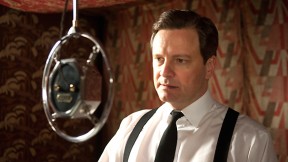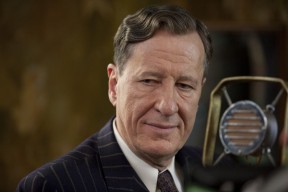 A great actor’s face is like an ocean under an ever changing sky. Reflecting every cloud. Every sun beam. So in the gaze of a gifted actor, even a flicker of hope, a blink of empathy, a tear just about to form itself in the memory of a loss, reveals to you a life story, the flash of a soul. In Tom Hooper’s magnificent The King’s Speech, you don’t just see the sweeping grandeur of palaces, you see the minutiae of lives. The inner struggles and the burden of failure and then the sunshine of triumph on the faces of its protagonists.
A great actor’s face is like an ocean under an ever changing sky. Reflecting every cloud. Every sun beam. So in the gaze of a gifted actor, even a flicker of hope, a blink of empathy, a tear just about to form itself in the memory of a loss, reveals to you a life story, the flash of a soul. In Tom Hooper’s magnificent The King’s Speech, you don’t just see the sweeping grandeur of palaces, you see the minutiae of lives. The inner struggles and the burden of failure and then the sunshine of triumph on the faces of its protagonists.
Watch hope giving away to pathos when the absolutely golden Geoffrey Rush auditions for a Shakespearean part before a self-important, bored panel and just one stumble over a word ends his dream. When they talk down to them, we don’t see them, we see his eyes. His dignity even as he is struggling to ask for another chance.
Watch Helena Bonham Carter, the insanely brilliant, maverick actress who revels in her dark, Tim Burton outings, watching her husband with love, empathy and gentle suffering as he struggles to find his voice. Such intelligence, such an articulate warm soul that shines through her whether she is having tea in a commoner’s parlour or cradling her husband as he breaks down.
Or watch Colin Firth recalling layer upon layer of humiliation imposed upon him by an impatient father, an insensitive nanny, a brother who makes fun of his stammer even in adulthood with a, “B..B..B..Bertie,” the painful metal splints to straighten his knock knees and then his eyes as they brim over the memory of a “sweet boy,” a loving brother who died young of epilepsy.
 Actors like these are the reasons why films transcend art and become life. And not once does Hooper lose sight of the human story while creating a visually operatic film with shots of sprawling estates, endless staircases, palaces and the note perfect Britain of the 1930s. This is seamless film making. A perfect needlepoint piece. The kind of a film where cinematic technique is invisible because it does not overwhelm the narrative but facilitates it. A film that shows that story telling is an art where every pause, every punch line, every dialogue must be where it should be.
Actors like these are the reasons why films transcend art and become life. And not once does Hooper lose sight of the human story while creating a visually operatic film with shots of sprawling estates, endless staircases, palaces and the note perfect Britain of the 1930s. This is seamless film making. A perfect needlepoint piece. The kind of a film where cinematic technique is invisible because it does not overwhelm the narrative but facilitates it. A film that shows that story telling is an art where every pause, every punch line, every dialogue must be where it should be.
And the writing. Pithy. Smart. Funny. Script writer David Seidler, himself having battled a stutter and cancer, writes stuff that leaps out of the screen, throbbing with insight.
The film glitters with great lines like, “We are not a family, father, we are a firm.”
The dialogue between Prince Albert, Duke of York, a man who would be king and his speech therapist Lionel Logue crackles with wit.
The horror of being inarticulate in public is established right at the onset when Colin Firth’s prince is stumbling through a speech at the British Empire Exhibition at Wembley Stadium.
From being asked to smoke to relax his lungs to putting marbles in his mouth and then trying to enunciate, the prince has tried everything and given up. His wife (Carter) finds an unconventional therapist in Lionel (Rush) who is not intimidated by Albert’s temper tantrums, or his conditioned ideas about station or entrenched personal inadequacies and insists on setting his own rules, one of which is that he will call the Duke, Bertie and would treat him like an equal.
Many false starts later, the two develop a bond and a therapy that is as unconventional as it is entertaining to watch. Cathartic swearing anyone?
There is an attempt to paint David, the Prince of Wales (Guy Pearce) and the controversial love of his life Wallis Simpson (Eve Best) in darker tones than necessary but in a well-recorded turn of events, after the death of George V when David or Edward VIII abdicates his throne to marry Wallis, it is Albert’s turn to be the King, his country is waiting to hear from in dark times of war.
How he battles his own fears of failure to reach a point where his first speech as King George VI becomes a landmark moment, reassuring and inspiring all those who had misgivings about their sense of nationhood and their monarch’s ability to lead them, forms the rest of the narrative. Danny Cohen’s atmospheric cinematography like every thing else in the film is in perfect harmony with the story, as is the unobtrusive music by Alexandre Desplat.
The film achieves what every work of art should. A sense of our shared humanity, our common struggles to overcome impediments, big and small and our desire to one day speak out and be heard. Watch it.





